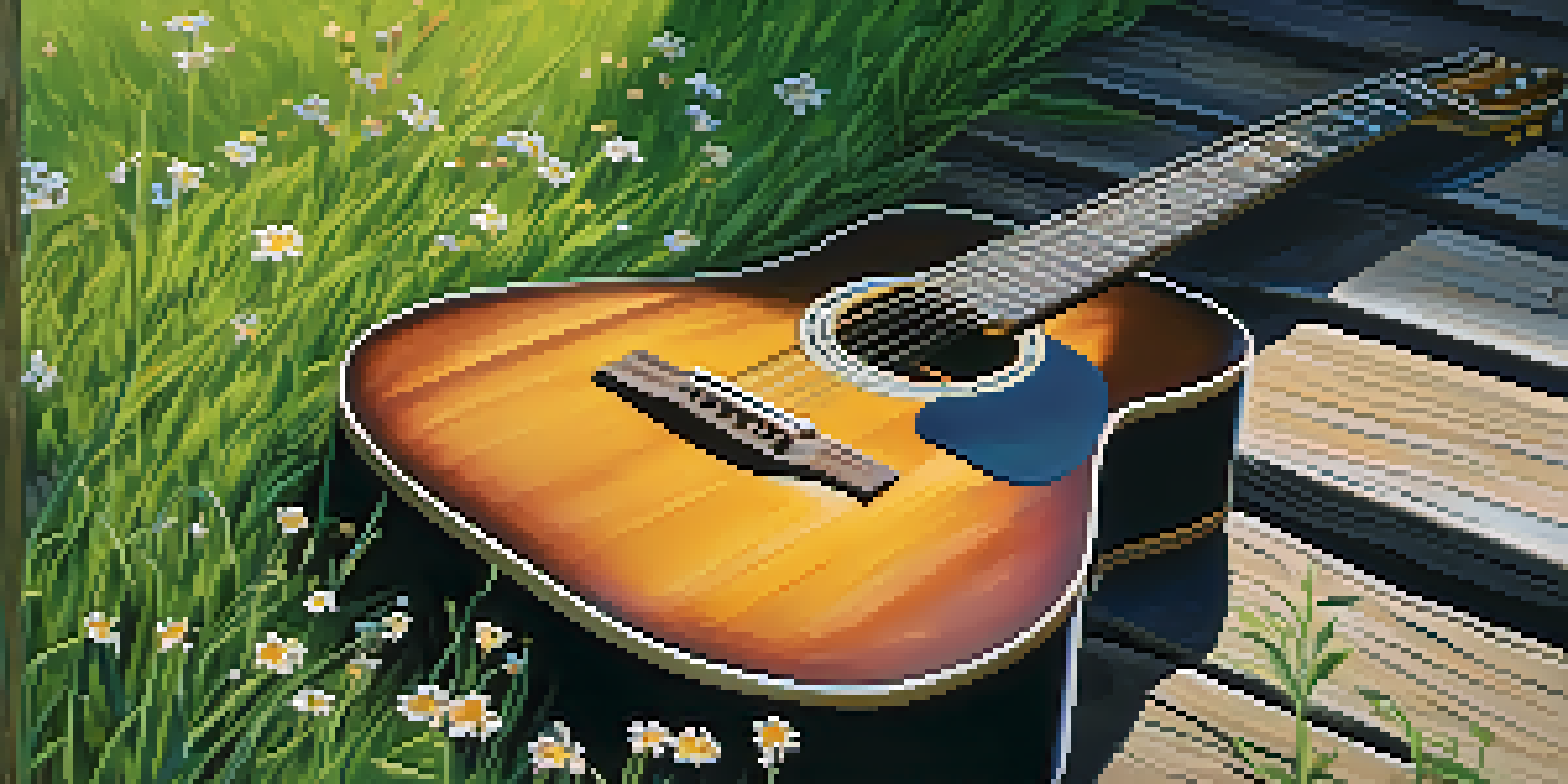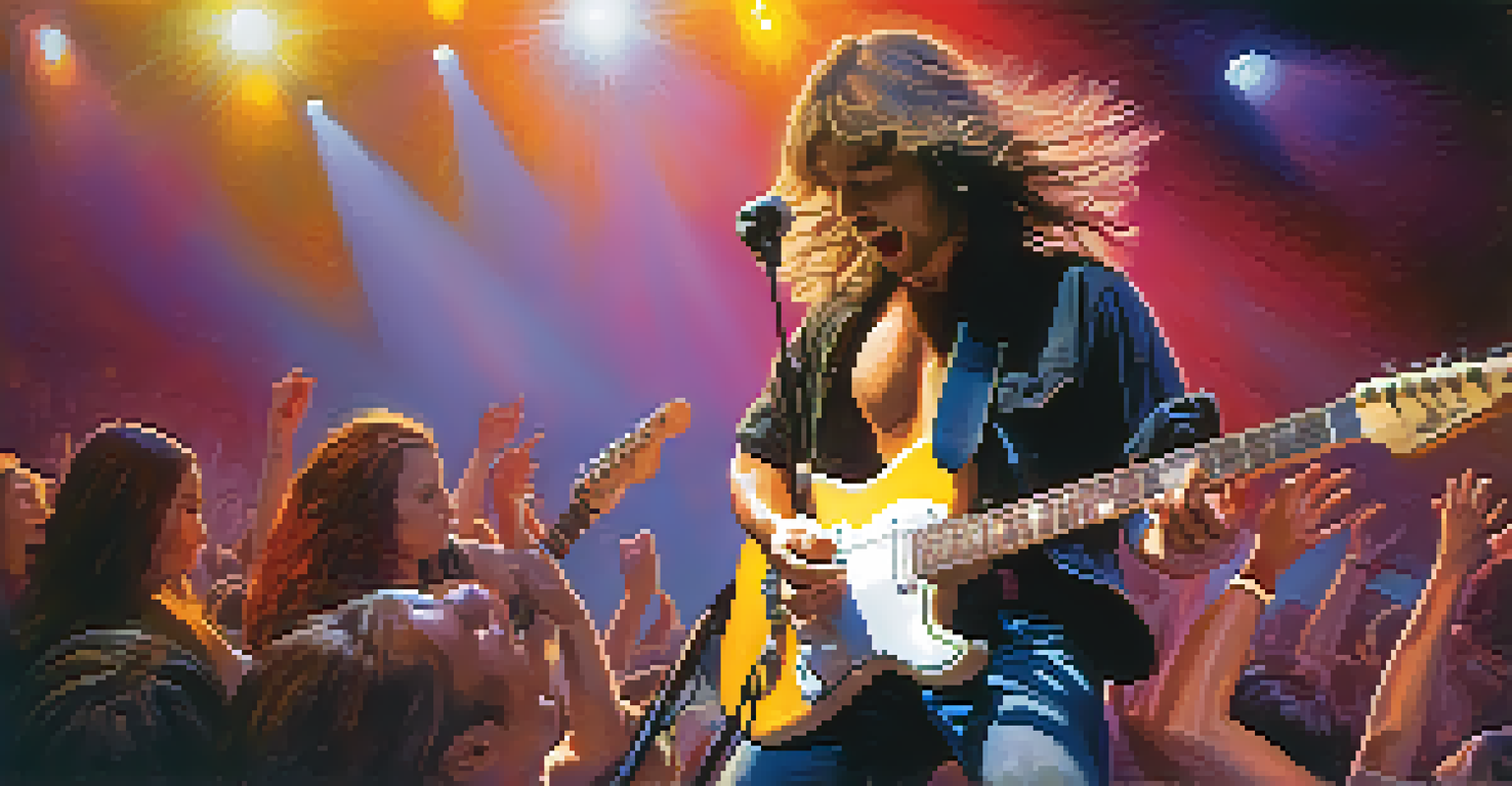The Impact of War on Guitar Music: A Historical Perspective

The Birth of Guitar Music Amidst Conflict
Guitar music has its roots in various cultural movements, and war has often played a crucial role in its evolution. From the Spanish Civil War to World War II, many musicians found themselves using the guitar to express the turmoil and suffering around them. This created a rich tapestry of music that not only resonated with the times but also provided solace to those affected by conflict.
Music is the weapon of the future.
During these turbulent times, the guitar became a vessel for emotions that were often too heavy to express in words. For instance, the haunting melodies of flamenco guitar in Spain were deeply influenced by the strife of the civil war, reflecting both passion and pain. Such music not only documented historical events but also fostered a sense of solidarity among listeners.
These early expressions set the stage for guitar music’s role as a powerful storytelling medium, allowing artists to convey the realities of war. As musicians strummed their guitars, they invited audiences into their world of hardship, resilience, and hope, laying the groundwork for the genres that would follow.
Folk Music: The Voice of the People
Folk music emerged prominently during times of war, serving as a voice for the common people. The acoustic guitar became a symbol of protest and resilience, with artists like Woody Guthrie and Pete Seeger penning songs that captured the struggles of the everyday person. Their work not only highlighted the social issues of their time but also inspired movements for change.

Songs like 'This Land Is Your Land' became anthems that resonated with those fighting for civil rights, showcasing how guitar music took on a new purpose as a tool for activism. The simplicity of the guitar made it accessible, allowing anyone to join in and share their own stories. This accessibility helped forge a community of musicians and listeners united by their experiences.
Guitar as a Voice of Resistance
Throughout history, guitar music has served as a powerful medium for protest, reflecting the struggles and resilience of people during times of war.
As folk music grew, it became intertwined with the historical narratives of war, forming a soundtrack for social justice movements. The guitar, in this context, was not just an instrument but a means to inspire collective action and bring awareness to pressing issues, proving that music can indeed change the world.
The Rise of Rock 'n' Roll and War's Influence
The 1950s and 1960s saw the rise of rock 'n' roll, a genre that was heavily influenced by the sociopolitical climate of the time, including the Vietnam War. Artists like Jimi Hendrix and Bob Dylan used their guitars to voice dissent and challenge the status quo. Their songs became rallying cries for a generation disillusioned by war and its consequences.
The power of music makes all the difference. It can bring us together, lift us up, and heal the wounds we carry.
The electric guitar, with its powerful sound, became a symbol of rebellion and freedom. Tracks like 'The Times They Are A-Changin'' served not only as reflections of the era but also as calls to action. The guitar’s raw energy captured the frustrations and hopes of a generation, making it a cornerstone of the cultural revolution.
As rock music evolved, so too did its relationship with war. It became a platform for artists to address themes of conflict and peace, creating a dialogue that resonated with audiences worldwide. This connection between guitar music and war left an indelible mark on the genre, shaping its evolution for years to come.
The Role of Guitar Music in Representing War Stories
In contemporary times, guitar music continues to serve as a medium for storytelling, particularly in relation to war experiences. Artists like Bruce Springsteen and Johnny Cash have woven narratives that encapsulate the struggles of soldiers and their families. These stories, often delivered through poignant guitar riffs, resonate deeply with listeners, bridging the gap between personal and collective experiences.
The guitar has the unique ability to evoke emotion, making it a powerful instrument for storytelling. By sharing their own or others' experiences, musicians help to humanize the often abstract concept of war. This personal touch invites listeners to empathize with the struggles faced by those affected by conflict.
War Shapes Musical Innovation
Conflicts have driven musicians to experiment with new techniques and sounds, leading to the evolution of unique guitar styles that resonate with the emotional landscapes of their eras.
Moreover, the emergence of genres like country and Americana has further solidified the guitar's role in narrating war stories. These genres often draw from personal experiences, reflecting the realities of life before, during, and after conflict. Through this lens, guitar music becomes a historical document, preserving the memories of those who lived through wartime.
The Evolution of Guitar Techniques Due to War
War has not only influenced the lyrical content of guitar music but has also shaped its technical aspects. During various conflicts, musicians began experimenting with new techniques and sounds, often inspired by the intense emotions surrounding them. This innovation led to the development of unique styles that reflected the zeitgeist of their respective eras.
For example, the use of distortion in rock music can be traced back to the chaotic sounds of war. The desire to express anger and frustration through music gave rise to powerful guitar riffs that became synonymous with the genre. This evolution highlighted how the context of war could inspire musicians to push boundaries and redefine their craft.
As guitarists adapted to the changing musical landscape, they also incorporated elements from different cultures affected by war. This blending of styles enriched the music scene, showcasing how the guitar can serve as a bridge between various musical traditions. Consequently, guitar music became a dynamic reflection of the times, continually evolving in response to the world around it.
The Influence of Technology on Guitar Music in Wartime
Technological advancements have played a significant role in the evolution of guitar music, particularly during wartime. The introduction of electric guitars and amplifiers revolutionized how music was produced and consumed. This transformation allowed artists to create more complex sounds, reflecting the emotional depth of the experiences they were portraying.
During conflicts, musicians often utilized technology to spread their messages more widely. The rise of radio and later television meant that guitar-driven songs could reach audiences far and wide, raising awareness about the effects of war. This accessibility allowed for a greater dialogue around conflict, as music became a medium for conveying important social and political messages.
Technology's Role in Music Spread
Advancements in technology during wartime have allowed guitar music to reach wider audiences, facilitating important conversations about war and its impact on society.
Additionally, the rise of home recording technology enabled musicians to create and share their work independently. This democratization of music production meant that voices from all walks of life could contribute to the conversation about war. The guitar, as a versatile instrument, became a tool for these emerging artists to express their unique perspectives, further diversifying the landscape of guitar music.
The Lasting Legacy of War on Guitar Music
The impact of war on guitar music is profound and lasting. As we look back at the various genres that have emerged, it’s clear that the themes of conflict, resilience, and hope continue to resonate with audiences today. Musicians have used their guitars to navigate the complexities of war, creating a legacy that influences new generations of artists.
Today’s musicians are still drawing inspiration from the struggles of the past. As contemporary issues arise, the guitar remains a symbol of expression and a tool for storytelling. Artists continue to explore themes related to war, using their music to comment on current events and inspire change.

Ultimately, the relationship between war and guitar music illustrates the power of art to reflect society’s struggles. As long as there are stories to tell, the guitar will remain a vital instrument for capturing the human experience, serving as a reminder of both the pain of conflict and the power of hope.